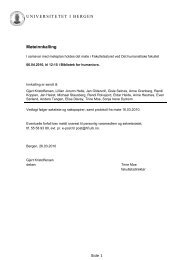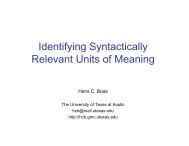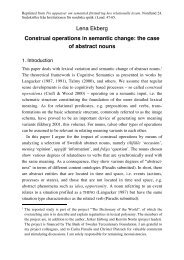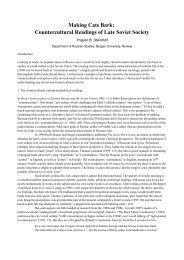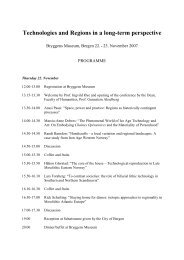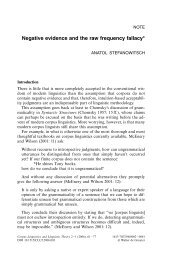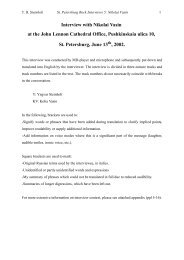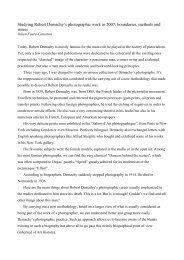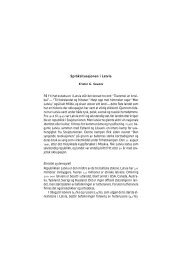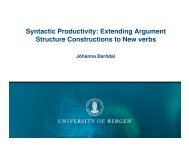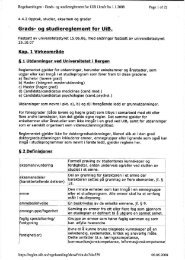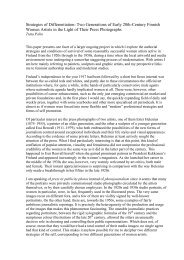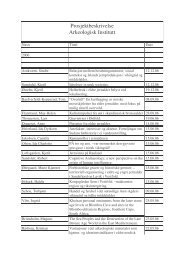THE BOOK OF POEMS IN TWENTIETH-CENTURY ... - TopReferat
THE BOOK OF POEMS IN TWENTIETH-CENTURY ... - TopReferat
THE BOOK OF POEMS IN TWENTIETH-CENTURY ... - TopReferat
Create successful ePaper yourself
Turn your PDF publications into a flip-book with our unique Google optimized e-Paper software.
Дневник—не стройный «рассказ о жизни», когда описывающий сегодняшний<br />
день уже знает завтрашний, знает, чем все кончится. Дневник—само течение<br />
жизни. В этом отличие «Современной записи» от всяких «Воспоминаний», и в<br />
этом ее особые преимущества: она воскрешает атмосферу, воскрешая<br />
исчезнувшие из памяти мелочи. «Воспоминания» могут дать образ времени.<br />
Но только дневник дает время в его длительности. 102<br />
Gippius, however, moved away from the diary form after her emigration. While<br />
she kept extensive journals in Russia, there is no sustained diary record of the years in<br />
Paris. Instead, she explored the form of the memoir (Живые лица) and the biography<br />
(Дмитрий Мережковский 103 ). In compiling Сияния, Gippius approached her verse<br />
differently as well. Instead of providing a complete, chronological series of poems which<br />
would resurrect a certain period in time, she selected and ordered them in a more<br />
deliberate way to provide a fuller picture of her own spiritual journey. A.V. Lavrov<br />
noted that Gippius left out her more contemporary, historically based poems in Сияния:<br />
“в этом нельзя не видеть сознательной авторской установки—преодолеть<br />
сиюминутное, сосредоточиться на изначально сущем и непреходящем. Видимо,<br />
Гиппиус, составляя книгу, осмысляла ее как подведение итогов в своих<br />
стихотворных медитациях, и такая задача диктовала определенные принципы<br />
отбора.” 104<br />
сборники стихов, рассказов, статей—являются случайными сборниками разных стихов, рассказов,<br />
статей, а не живым целым—книгою. Gippius, Stikhotvoreniia, 38.<br />
102 Gippius, Dnevniki, vol. 1, 381-2. The word "длительность" suggests the Bergsonian term "durée," a<br />
concept largely understood by Russian modernists as the "constant flow of divine reality that can be<br />
apprehended only through an effort of intuition." Hilary L. Fink, Bergson and Russian Modernism, 1900-<br />
1930 (Evanston, Ill.: Northwestern University Press, 1999), xviii. In a 1930 letter to Gerell, however,<br />
Gippius used the French term to refer to two distinct periods in her life: the present "durée" and the past<br />
"durée." In this usage, Gippius "obscures the true Bergsonian sense of the term as the indivisible, ceaseless<br />
flow of reality, 'succession without distinction'" Ibid., 60. Thus, Gippius, appears to use Bergsonian terms<br />
loosely, not adhering to a strict reading of his philosophy. Gippius invokes Bergson in two poems in<br />
Сияния to be discussed later in the chapter: "Eternité Frémissante"and "Веер."<br />
103 The Merezhkovsky biography was initially titled Он и Мы, suggesting an autobiographical or<br />
memoiristic nature.<br />
104 Gippius, Stikhtovoreniia, 64.<br />
85



